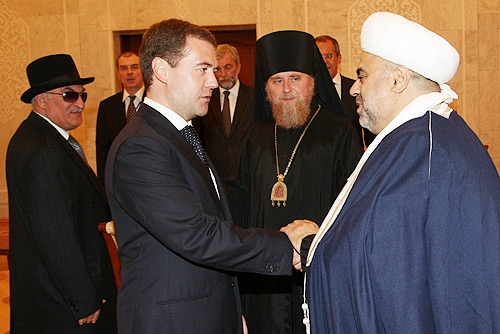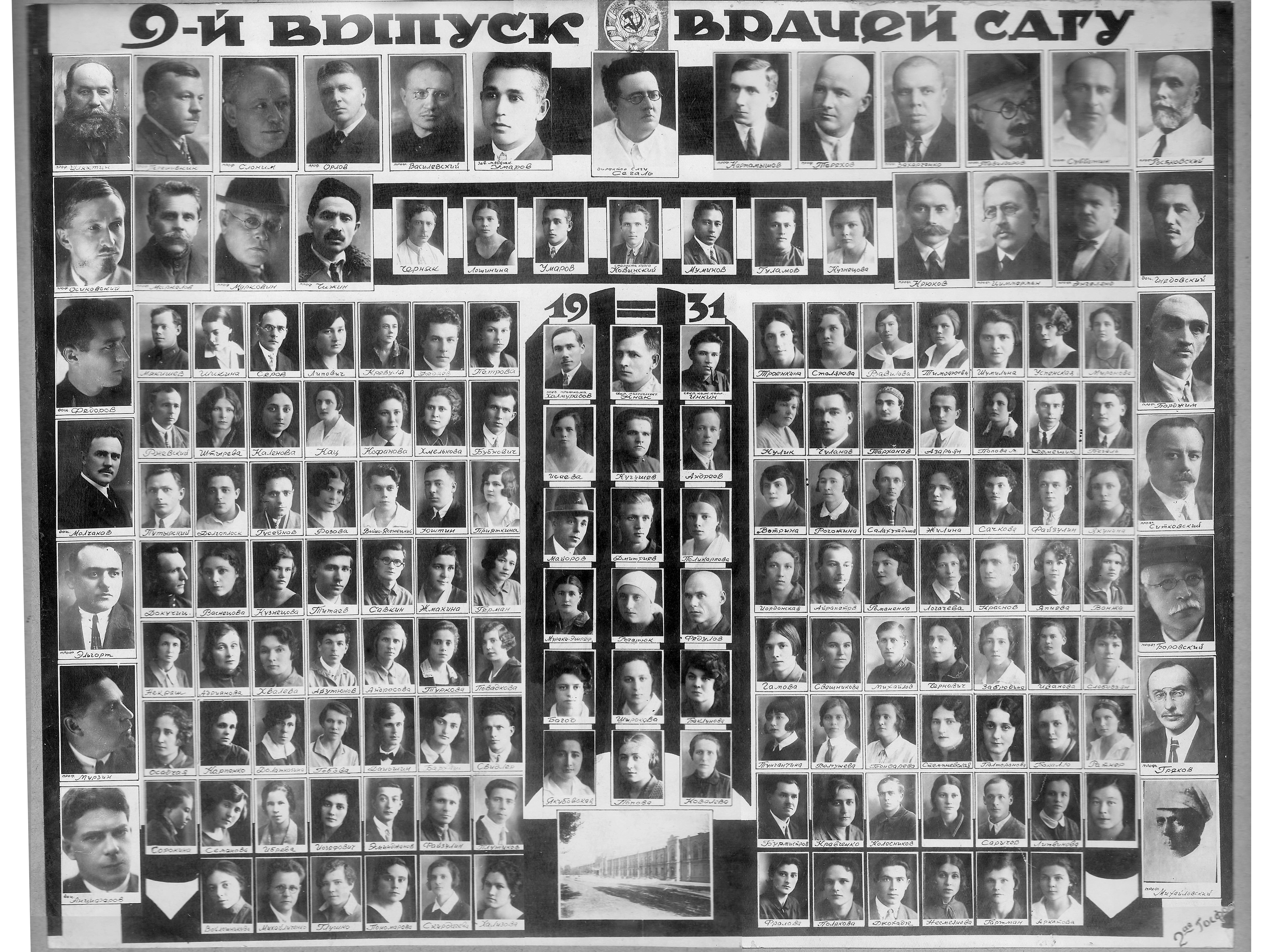|
Allahshukur Pashazade
Haji Allahshükür Hummat Pashazade ( az, Allahşükür Hümmət Paşazadə) is the Sheikh ul-Islam and Grand Mufti of the Caucasus which includes the Republic of Azerbaijan, the Republic of Georgia, and Dagestan, Kabardino-Balkaria, Ingushetia, Chechnya, Karachay–Cherkessia, and Adygea in the Russian Federation. He is also the chairman of the Religious Council of the Caucasus. Biography Pashazade was born in Cil, Lankaran Rayon, Azerbaijan Soviet Socialist Republic (today the Republic of Azerbaijan) on August 26, 1949 and is of Talysh descent. He got his primary religious education in the city of Lankaran. In 1968 he went to the Uzbekistan Soviet Socialist Republic (today the independent Republic of Uzbekistan) where he entered the Mir-i-Arab Madrasah in Bukhara and later relocated to Tashkent where he finished his religious education in Tashkent State University in 1975. He returned to Azerbaijan in 1975 and became the acting secretary of the Caucasian Muslims Office ... [...More Info...] [...Related Items...] OR: [Wikipedia] [Google] [Baidu] |
Islam
Islam (; ar, ۘالِإسلَام, , ) is an Abrahamic religions, Abrahamic Monotheism#Islam, monotheistic religion centred primarily around the Quran, a religious text considered by Muslims to be the direct word of God in Islam, God (or ''Allah'') as it was revealed to Muhammad, the Muhammad in Islam, main and final Islamic prophet.Peters, F. E. 2009. "Allāh." In , edited by J. L. Esposito. Oxford: Oxford University Press. . (See alsoquick reference) "[T]he Muslims' understanding of Allāh is based...on the Qurʿān's public witness. Allāh is Unique, the Creator, Sovereign, and Judge of mankind. It is Allāh who directs the universe through his direct action on nature and who has guided human history through his prophets, Abraham, with whom he made his covenant, Moses/Moosa, Jesus/Eesa, and Muḥammad, through all of whom he founded his chosen communities, the 'Peoples of the Book.'" It is the Major religious groups, world's second-largest religion behind Christianity, w ... [...More Info...] [...Related Items...] OR: [Wikipedia] [Google] [Baidu] |
Chechnya
Chechnya ( rus, Чечня́, Chechnyá, p=tɕɪtɕˈnʲa; ce, Нохчийчоь, Noxçiyçö), officially the Chechen Republic,; ce, Нохчийн Республика, Noxçiyn Respublika is a republic of Russia. It is situated in the North Caucasus of Eastern Europe, close to the Caspian Sea. The republic forms a part of the North Caucasian Federal District, and shares land borders with the country of Georgia to its south; with the Russian republics of Dagestan, Ingushetia, and North Ossetia-Alania to its east, north, and west; and with Stavropol Krai to its northwest. After the dissolution of the Soviet Union in 1991, the Checheno-Ingush ASSR split into two parts: the Republic of Ingushetia and the Chechen Republic. The latter proclaimed the Chechen Republic of Ichkeria, which sought independence. Following the First Chechen War of 1994–1996 with Russia, Chechnya gained ''de facto'' independence as the Chechen Republic of Ichkeria, although ''de jure'' it rem ... [...More Info...] [...Related Items...] OR: [Wikipedia] [Google] [Baidu] |
Akhund
Akhund (akhoond, akhwand, akhand or akondo) ( fa, آخوند) is a Persian title or surname for Islamic scholars, common in Iran, Afghanistan, Tajikistan, Pakistan, Bangladesh and Azerbaijan. Other names for similar Muslim Scholar include sheikh and mullah. The Standard Chinese word for imam (), used in particular by the Hui people, also derives from this term. Duty Akhunds are religious and spiritual leaders. They lead the prayers in the mosques, deliver religious sermons, perform religious ceremonies such as milad, marriage rituals, birth rituals etc. Many of them were magistrates or justices of Sharia courts who also exercised extrajudicial functions, such as mediation, guardianship over orphans and minors, and supervision and auditing of public works. They also often teach in Islamic schools known in Iran as hawzas and in other countries as madrasas. Akhunds will usually have completed higher studies on Islamic subjects such as Sharia, Fiqh (Islamic jurisprudence), Quran e ... [...More Info...] [...Related Items...] OR: [Wikipedia] [Google] [Baidu] |
Tashkent State University
National University of Uzbekistan (NUUz) () is a public university located in Tashkent, Uzbekistan. NUUz is the oldest and largest university in Uzbekistan. National University of Uzbekistan is named after Mirzo Ulugbek. NUUz professors and teaching staff work with modern materials and science and have relationships with the world's distinguished scientific schools. History Higher educational institutions originated in eastern Iran in the 10th century CE and spread to major urban centers throughout the Middle East by the late 11th century. Simultaneously, universities were established in the West. In the beginning of the 20th century, jadids tried to establish universities with the collaboration of Russian democrats. Muslim People University was headed by a council consisting of 45 people. It aimed to offer higher, secondary and primary education. In autumn, Muslim People University and its founders were the first victims of repression from communists. The government of the So ... [...More Info...] [...Related Items...] OR: [Wikipedia] [Google] [Baidu] |
Tashkent
Tashkent (, uz, Toshkent, Тошкент/, ) (from russian: Ташкент), or Toshkent (; ), also historically known as Chach is the capital and largest city of Uzbekistan. It is the most populous city in Central Asia, with a population of 2,909,500 (2022). It is in northeastern Uzbekistan, near the border with Kazakhstan. Tashkent comes from the Turkic ''tash'' and ''kent'', literally translated as "Stone City" or "City of Stones". Before Islamic influence started in the mid-8th century AD, Tashkent was influenced by the Sogdian and Turkic cultures. After Genghis Khan destroyed it in 1219, it was rebuilt and profited from the Silk Road. From the 18th to the 19th century, the city became an independent city-state, before being re-conquered by the Khanate of Kokand. In 1865, Tashkent fell to the Russian Empire; it became the capital of Russian Turkestan. In Soviet times, it witnessed major growth and demographic changes due to forced deportations from throughout the Sov ... [...More Info...] [...Related Items...] OR: [Wikipedia] [Google] [Baidu] |
Bukhara
Bukhara (Uzbek language, Uzbek: /, ; tg, Бухоро, ) is the List of cities in Uzbekistan, seventh-largest city in Uzbekistan, with a population of 280,187 , and the capital of Bukhara Region. People have inhabited the region around Bukhara for at least five millennia, and the city has existed for half that time. Located on the Silk Road, the city has long served as a center of trade, scholarship, culture, and religion. The mother tongue of the majority of people of Bukhara is Tajik language, Tajik, a dialect of the Persian language, although Uzbek language, Uzbek is spoken as a second language by most residents. Bukhara served as the capital of the Samanid Empire, Khanate of Bukhara, and Emirate of Bukhara and was the birthplace of scholar Imam Bukhari. The city has been known as "Noble Bukhara" (''Bukhārā-ye sharīf''). Bukhara has about 140 architectural monuments. UNESCO has listed the historic center of Bukhara (which contains numerous mosques and madrasas) as a List o ... [...More Info...] [...Related Items...] OR: [Wikipedia] [Google] [Baidu] |
Mir-i-Arab Madrasah
Po-i-Kalan, or Poi Kalan ( uz, Poi Kalon, fa, ''Pā-i Kalān'', which means "At the Foot of the Great One"), is an Islamic religious complex located in Bukhara, Uzbekistan. The complex consists of three parts, the Kalan Mosque (''Masjid-i Kalan''), the Kalan Minaret (Minâra-i Kalân) to which the name refers to, and the Mir-i-Arab Madrasah. The positioning of the three structures creates a square courtyard in its center, with the Mir-i-Arab and the Kalan Mosque standing on opposite ends. In addition, the square is enclosed by a bazaar and a set of baths connected to the Minaret on the northern and southern ends respectively. The congregational mosque in the complex is one of the largest mosques in Central Asia, behind the Bibi Khanum Mosque in Samarkand, Uzbekistan, and the Great Mosque of Herat in Afghanistan. Construction history Both the Kalan Mosque and Minaret were initially commissioned by Arslan Khan in 1121, with the famed Kalan Minaret concluding construction ... [...More Info...] [...Related Items...] OR: [Wikipedia] [Google] [Baidu] |
Republic Of Uzbekistan
A republic () is a "sovereign state, state in which Power (social and political), power rests with the people or their Representative democracy, representatives; specifically a state without a monarchy" and also a "government, or system of government, of such a state." Previously, especially in the 17th and 18th centuries, the term was used to imply a state with a Democracy, democratic or Representative democracy, representative constitution (constitutional republic), but more recently it has also been used of autocratic or dictatorial states not ruled by a monarch. It is now chiefly used to denote any non-monarchical state headed by an elected or appointed president. , List of countries by system of government, 159 of the world's List of sovereign states, 206 sovereign states use the word "republic" as part of their official names. Not all of these are republics in the sense of having elected governments, nor is the word "republic" used in the names of all states with elected ... [...More Info...] [...Related Items...] OR: [Wikipedia] [Google] [Baidu] |

.jpg)
.jpg)



